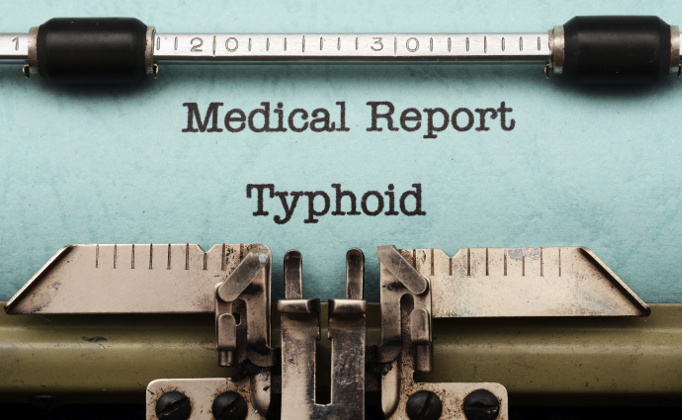The incubation period of Typhoid Fever is six-30 days. When illness starts, it is slow with gradually increasing symptoms:
TYPHOID FEVER
- Home

WHAT IS IT, AND WHERE AM I AT RISK?
Typhoid fever is a bacterial/febrile illness caused by the bacterium Salmonella typhi. This bacteria only infects humans, and is picked up when a person ingests contaminated food and/or water and the infection occurs in the digestive tract, reticuloendothelial system, and gall bladder.
It is estimated that there are more than 22 million cases worldwide annually, and of those, more than 200,000 related deaths.
The risk for Typhoid Fever is highest for travelers to South Asia, but it is also a risk in East and SE Asia, Africa, the Caribbean, and Central and South America. It is prevalent in countries with warm climates, and less-developed areas. Risk is also elevated for those individuals who travel for longer periods of time, those who are adventurous eaters, and those who travel out into rural areas.
The risk of contracting Typhoid Fever is higher for individuals who are visiting friends and relatives in home environments. This situation can occur for a number of reasons; such as lack of awareness of the risk of Typhoid, a number of these travelers not seeking pre-travel care, cultural and language barriers, a lack of trust in medical providers or the health care system, or a belief that returning to their native environment would give them immunity.
SYMPTOMS AND TREATMENT
- fatigue
- headache
- malaise
- anorexia (no appetite)
- fever that gets higher for three- four days, lowest temp in the morning, and higher later in the day
- rash - rose colored spots in irregular patterns
If this disease is untreated, it can last for over a month.
Serious complications of Typhoid Fever can occur, and usually appear after two- three weeks of being ill. These may include:
- intestinal hemorrhage
- intestinal perforation
- these complications may be life threatening if not properly treated

Treatments may include antibiotics, which would target shortening the clinical symptoms of the disease and reduce the risk of death. Even when antibiotics are started, it may take three- five days of treatment for a significant improvement to be seen, and patients may actually say they feel worse with the treatment before they feel better.
If improvements are not seen after five days with appropriate medications, it may be necessary to try a new treatment plan.

WHAT CAN I DO TO PREVENT TYPHOID FEVER?
The CDC (Center for Disease Control) recommends the best preventative measure you can take is to receive a typhoid vaccine before traveling to any risk area.
While studies show that the vaccine is not 100% effective in preventing the disease, and an individual still may contract the disease, current vaccines can provide up to 80% protection.
The typhoid vaccine can be given to anyone two years of age and over, and it is recommended that a traveler complete this vaccine two weeks or more before any expected exposure. In the United States, the Typhoid Fever vaccine lasts for two years.
One other preventative measure that can be protective is careful selection of food, water, and other beverages.
